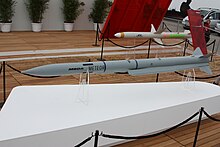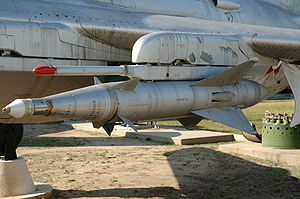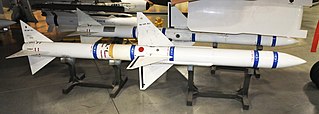
The AIM-7 Sparrow is an American medium-range semi-active radar homing air-to-air missile operated by the United States Air Force, United States Navy, United States Marine Corps, and various other air forces and navies. Sparrow and its derivatives were the West's principal beyond visual range (BVR) air-to-air missile from the late 1950s until the 1990s. It remains in service, although it is being phased out in aviation applications in favor of the more advanced AIM-120 AMRAAM.

The Rafael Python (פיתון) is a family of air-to-air missiles (AAMs) built by the Israeli weapons manufacturer Rafael Advanced Defense Systems, formerly RAFAEL Armament Development Authority. Originally starting with the Shafrir series, the Shafrir-1 missile was developed in 1959, followed by the Shafrir-2 in early 1970s. Subsequently, the missiles were given the western name of "Python" by the parent company for export purposes, starting with the Python-3 in 1978. Since then, it has been further developed and evolved into the Python-4, Python-5, Derby and also, the SPYDER, an advanced ground-based air-defence system. Currently, the missiles are in service with the armed forces of over fifteen countries from around the world.
Semi-active radar homing (SARH) is a common type of missile guidance system, perhaps the most common type for longer-range air-to-air and surface-to-air missile systems. The name refers to the fact that the missile itself is only a passive detector of a radar signal—provided by an external ("offboard") source—as it reflects off the target. Semi-active missile systems use bistatic continuous-wave radar.

The Vympel NPO R-77 missile is a Russian active radar homing beyond-visual-range air-to-air missile. It is also known by its export designation RVV-AE. It is the Russian counterpart to the American AIM-120 AMRAAM missile.

The Kaliningrad K-8 (R-8) was a medium-range air-to-air missile developed by the Soviet Union for interceptor aircraft use.

The Vympel K-13 is a short-range, infrared homing air-to-air missile developed by the Soviet Union. It is similar in appearance and function to the American AIM-9B Sidewinder from which it was reverse-engineered. Although it since has been replaced by more modern missiles in frontline service, it saw widespread service in many nations.

The MolniyaR-60 is a short-range lightweight infrared homing air-to-air missile designed for use by Soviet fighter aircraft. It has been widely exported, and remains in service with the CIS and many other nations.

Fire-and-forget is a type of missile guidance which does not require further external intervention after launch such as illumination of the target or wire guidance, and can hit its target without the launcher being in line-of-sight of the target. This is an important property for a guided weapon to have, since a person or vehicle that lingers near the target to guide the missile is vulnerable to attack and unable to carry out other tasks.

The Hughes AIM-4 Falcon was the first operational guided air-to-air missile of the United States Air Force. Development began in 1946; the weapon was first tested in 1949. The missile entered service with the USAF in 1956.

The BisnovatR-4 was an early Soviet long-range air-to-air missile. It was used primarily as the sole weapon of the Tupolev Tu-128 interceptor, matching its RP-S Smerch ('Tornado') radar.

The BisnovatR-40 is a long-range air-to-air missile developed in the 1960s by the Soviet Union specifically for the MiG-25P interceptor, but can also be carried by the later MiG-31. It is the largest air-to-air missile in the world ever to go into production.

The R-33 is a long-range air-to-air missile developed by Vympel. It is the primary armament of the MiG-31 interceptor, intended to attack large high-speed targets such as the SR-71 Blackbird, the B-1 Lancer bomber, and the B-52 Stratofortress.
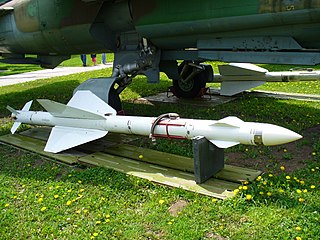
The Vympel R-23 is a medium-range air-to-air missile developed by Vympel in the Soviet Union for fighter aircraft. An updated version with greater range, the R-24, replaced it in service. It is comparable to the American AIM-7 Sparrow, both in terms of overall performance as well as role.
A beyond-visual-range missile is an air-to-air missile that is capable of engaging at ranges of 20 nmi (37 km) or beyond. This range has been achieved using dual pulse rocket motors or booster rocket motor and ramjet sustainer motor.

Active radar homing (ARH) is a missile guidance method in which a missile contains a radar transceiver and the electronics necessary for it to find and track its target autonomously. The NATO brevity code for an air-to-air active radar homing missile launch is fox three.

Infrared homing is a passive weapon guidance system which uses the infrared (IR) light emission from a target to track and follow it seamlessly. Missiles which use infrared seeking are often referred to as "heat-seekers" since infrared is radiated strongly by hot bodies. Many objects such as people, vehicle engines and aircraft generate and emit heat and so are especially visible in the infrared wavelengths of light compared to objects in the background.

The PL-12 is an active radar-guided beyond-visual-range air-to-air missile developed by the People's Republic of China. It is considered comparable to the US AIM-120 AMRAAM and the Russian R-77.
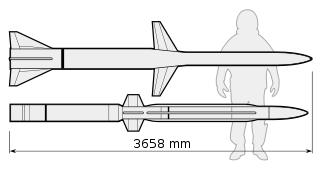
The AIM-152 Advanced Air-to-Air Missile (AAAM) was a long-range air-to-air missile developed by the United States. The AIM-152 was intended to serve as the successor to the AIM-54 Phoenix. The program went through a protracted development stage but was never adopted by the United States Navy, due to the ending of the Cold War and the reduction in threat of its perceived primary target, Soviet supersonic bombers. Development was cancelled in 1992.

The AIM-9 Sidewinder is a short-range air-to-air missile. Entering service with the United States Navy in 1956 and the Air Force in 1964, the AIM-9 is one of the oldest, cheapest, and most successful air-to-air missiles. Its latest variants remain standard equipment in most Western-aligned air forces. The Soviet K-13, a reverse-engineered copy of the AIM-9B, was also widely adopted.

The PL-10, formerly known as PL-ASR, is a short-range, infrared-homing air-to-air missile (AAM) developed by the People's Republic of China. It was designed by Dr. Liang Xiaogeng (梁晓庚) at the Luoyang Electro Optical Center, which is also known as the Institute 612 and was renamed in 2002 as the China Air-to-Air Guided Missile Research Institute (中国空空导弹研究院). Development of the missile commenced in 2004 for use on stealth fighters such as the J-20.


